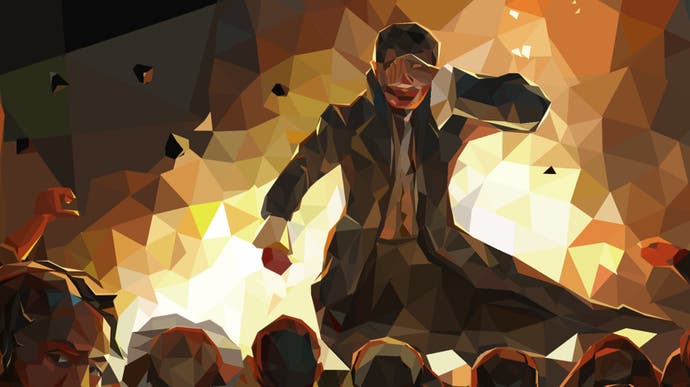We. The Revolution is a horribly queasy game about life and death
Judge dread.
From Papers Please to Aviary Attorney, I am a sucker for narrative games involving quick thinking and paperwork. When I stumbled across We. The Revolution at this year's PAX West, then, I was keen to jump straight in. Afterward, I needed a good long sit down. Just as a heads-up for those who might find it upsetting, this article touches on topics such as sexual assault and religious persecution.
We. The Revolution (and its bizarrely placed full stop) is a game in which you play as a judge in one of the courts of Paris during the French Revolution. You preside over a series of cases, trying to serve justice and keep everybody happy in a roiling, oppressive and above all deadly atmosphere. There are around a hundred cases in the game and players can expect to tackle around 25 of them in a given playthrough. At the start of each case, you sift through the written evidence set on the desk before you, clicking on pertinent keywords as you go. Once you've gathered all the keywords, you start forging links between them - selecting two at a time. Successfully linking two keywords will unlock a new question to ask the defendant. Get it wrong, however, and you might end up losing a keyword altogether, limiting the number of questions you can unlock during that case.
The questions you gather are then asked of the defendant, with the answers determining the opinions of the jury and the public watching the case, as well as the overall mood of the courtroom. Let them get too riled up, for example, and things may start happening that are beyond your control.
Once you've exhausted your list of questions, you need to fill in a short questionnaire that tests your understanding of the case by asking specifics, but also includes such questions as whether the crime was counter-revolutionary in nature or whether the evidence supports the accusation. Once that's done, you move on to delivering a verdict. Your options are acquittal, imprisonment or, this being revolutionary France, the guillotine.
Your actions in this stage are pivotal, influencing how the public, the jury and the shadowy revolutionaries see you. You can go against the wishes of any of these groups, but there are consequences that affect the game moving forward, so there's a tremendous sense of tension between what you feel is just and what would be most beneficial for you. There are a lot of moving parts to We. The Revolution, in other words, and it all combines to create a tremendous sense of pressure - and that's before we've even touched on the cases themselves.
The first case I had to tackle during my time with We. The Revolution was one in which a man - commonly regarded as a hero of the revolution - was accused of raping a young woman. His manner in the courtroom was arrogant, dismissive and unrepentant of his treatment of women, even in the face of a doctor's report testifying that the victim had bruising consistent with a struggle. The jury and the crowd were both heavily in favour of acquittal, but the evidence and the man's repugnant attitude had me thoroughly convinced of his guilt. The evidence, however, shocking though it was, could not prove the man's guilt beyond doubt. Grimacing, I acquitted him, and I felt thoroughly sick.
The next case involved a former Catholic priest accused of giving the sacrament to people in secret - a charge considered grievously counter-revolutionary in nature. Before the trial started, however, my wife and child came to the courtroom in order to beg me to acquit him - the priest, they said, was a good man and didn't deserve to be on trail. The trial itself was brutal. There was an overwhelming body of evidence, the jury was convinced of his guilt and the crowd, frankly, was out for blood. I sent him to the guillotine, but again following the legal protocol and trying to be an impartial judge left me feeling drained and guilty. Worse still, there is a scene at the family dinner table after each case (as a way of updating the player on the overall state of Paris and their place in it) - I had to face my family and their bitter disappointment at my actions.
Essentially, We. The Revolution is a balancing act that doesn't shy away from heavy subject matter or an oppressive atmosphere. Trying to manage the various factions of the court, family life and even the political machinations of Robespierre (whose edicts you will sometimes have to weigh in on, influencing his opinion of you) is a daunting task and one that feels like trying to keep your head above water in a churning sea. It's a gorgeous looking game and its mechanics are very pleasing, but I honestly can't remember the last time a game had quite such an oppressive atmosphere. Impressive and upsetting in equal measure, it's really stuck with me in the days since I played it and I'm still not quite sure how to feel about it - or about the choices I made during my play time. It's one to watch, I think, but only for those with the stomach for it.










